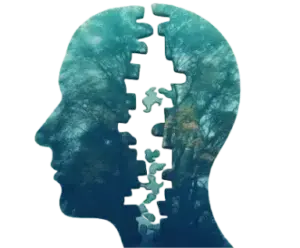Do you ever lie in bed at night, wide awake, staring at the ceiling, unable to drift off? You're not...
Manasaroga evum manovigyan
Your journey to mental wellness begins here

A Closer Look At Manovigyan In Ayurveda
- Manovigyan in Ayurveda is the branch that deals with mental health and psychiatry. In Sanskrit, it combines “Manas” (mind) and “Vigyan” (science), translating to the science of the mind.
- It addresses mental health holistically, considering factors like diet, lifestyle, and dosha balance (Vata, Pitta, and Kapha) to understand and manage issues.
- It involves holistic practices like herbal remedies, diet, lifestyle changes, yoga, meditation, and specific therapies.
Manovigyan Department at Parul Ayurved Hospital deals with
Meet Our Team Of Experts
Uncover unparalleled expertise in mental health and wellness with our team of best Ayurvedic Manovigyan specialists. Renowned for the most proficient Ayurvedic treatment for stress and depression, our specialists are dedicated to providing top-notch care, ensuring the highest standards of Ayurvedic healing.
Take A Look At Our Restorative Treatment Modalities
FAQ's
How does Ayurveda approach stress?
Ayurveda views stress as an imbalance in the doshas, emphasising a holistic approach to restore harmony in the mind and body. The treatment involves identifying the unique constitution of an individual (Prakriti), addressing imbalances (Vikriti), incorporating herbal remedies, dietary adjustments, lifestyle modifications, and therapies like meditation and yoga to promote overall well-being.
How long does it take to see results with Ayurvedic treatment for stress?
The duration to observe results with Ayurvedic treatment for stress varies among individuals. Factors such as the severity of stress, adherence to the prescribed regimen, and individual response to therapies influence the timeline. Generally, positive changes may be noticed within a few weeks, with ongoing improvements over time as the body and mind harmonise through holistic Ayurvedic interventions
Is Ayurvedic treatment for stress safe?
Yes, Ayurvedic treatment for stress is generally considered safe when administered by qualified practitioners. Ayurveda makes use of natural remedies, tailored treatments, and holistic well-being, diminishing the risk of adverse impact. However, it is significant to consult with a specialist of Manovigyan to ensure that the treatment is correct according to individual needs and health circumstances.
Can Ayurveda be used alongside conventional treatments for stress & depression?
Yes, Ayurveda can complement conventional treatments for stress and depression. Integrative approaches, combining Ayurvedic therapies with conventional methods, may enhance overall effectiveness. It is advisable to inform both Ayurvedic and conventional healthcare providers about the treatments being pursued to facilitate coordinated care.
Can Ayurveda help prevent relapses of depression in the long term?
Ayurveda possesses the purpose to address the actual causes of depression, facilitating long-term well-being. Through customised treatments, lifestyle alterations, and consistent maintenance, Ayurveda keeps the goal to minimise the risk of relapses. Consistency in following Ayurvedic principles and periodic consultations can contribute to sustained mental health.
Is Ayurvedic treatment suitable for all types of depression?
Ayurvedic treatment is tailored based on individual constitutions (Prakriti) and imbalances (Vikriti). While it can be beneficial for various types of depression, including mild to moderate cases, severe or chronic conditions may require a comprehensive approach involving collaboration with conventional medical interventions.
What role does diet play in Ayurvedic treatment for depression?
Diet plays a significant role in Ayurvedic treatment for depression. Recommendations focus on a balanced, sattvic diet comprising fresh fruits, vegetables, whole grains, and moderate dairy. Avoidance of stimulants and processed foods is emphasised to support mental well-being and balance the doshas.
What are the main causes of depression according to Ayurveda?
Ayurveda attributes depression to imbalances in the doshas, particularly aggravated Vata, Pitta, or Kapha. Contributing factors include improper diet, disrupted daily routines, environmental influences, emotional stress, and unresolved mental patterns. Addressing these root causes is integral to Ayurvedic approaches.
Are there specific Ayurvedic practices or therapies recommended for managing depression?
Ayurvedic practices for managing depression include herbal remedies, meditation, yoga, Sirodhara, and Panchakarma therapies tailored to individual needs. These aim to rebalance doshas, alleviate stress, and promote mental clarity. A qualified Ayurvedic practitioner can recommend a personalised plan based on an individual’s constitution and imbalances.
Are there lifestyle changes recommended in Ayurveda to support treatment for stress & depression?
Yes, Ayurveda advocates lifestyle changes to support stress and depression treatment. Recommendations include maintaining a regular daily routine (Dinacharya), incorporating stress-reducing practices like meditation and yoga, ensuring proper sleep, and fostering positive social interactions to create a harmonious and balanced lifestyle.
Are there lifestyle changes recommended in Ayurveda to support treatment for stress & depression?
Stress management is integral to Ayurvedic approaches for treating depression. Ayurveda emphasises techniques such as meditation, yoga, and stress-reducing therapies to address the mental and emotional aspects of stress. By promoting a balanced lifestyle and mental resilience, Ayurveda aims to prevent and alleviate the impact of stress on overall mental health.
Recent Blogs
Balancing Hormones Naturally with Ayurveda
October 9, 2024
Have you ever felt like your body’s internal rhythm is slightly off? Maybe you’re not sleeping well, feeling unusually stressed,...
Ayurvedic Diet Tips For Managing Depression
May 10, 2024
Understanding Ayurvedic Diet for Managing Depression The "Department of Manasaroga evam Manovigyan," >which focuses on psychological disorders in Ayurveda, underlines...
Ayurvedic Approach to Alzheimer’s Disease: Supporting Cognitive Function and Memory
April 5, 2024
Alzheimer's, a condition that erodes memory and cognitive functions, has been a focus of modern medicine for many years. That...
Nurturing Mental Healthiness Through The Power Of Ayurveda
December 15, 2023
In the expeditious modern world, where stress and anxiety have become nearly universal, the search for mental wellness has never...
Recovery Awaits You!
Experience Ayurvedic Healing Now











